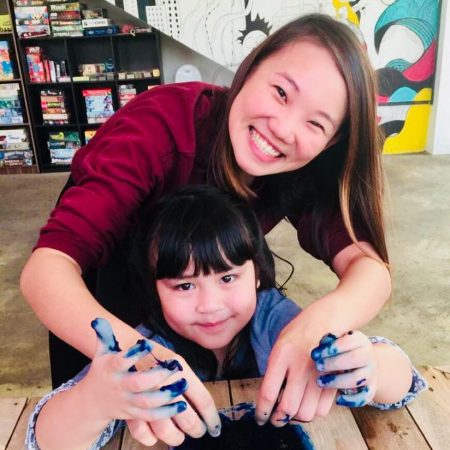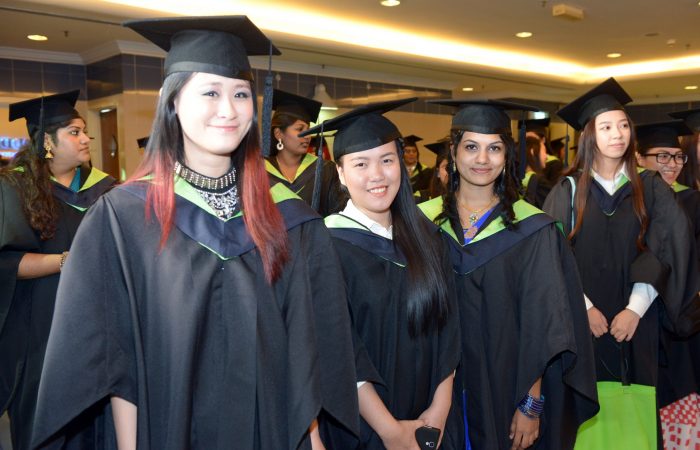05 Nov Early Childhood Education: Trends and Educator Roles
Trends and Educator Roles: Be Inspired to Aspire Young Minds

Kenny Sim, Chief Executive, Dika College
“The events of the last two years are a test of the commitment to education, specifically early childhood education. It is imperative now, more than ever, for educators to learn from the past, embrace new trends, and collaborate with parents to help children get back on track and adapt to the new normal. This is the Dika commitment and we are committed to doing our part.”
Kenny Sim, Chief Executive, Dika College.
This Industry Insight discusses the current quandary unleashed by COVID-19 and trends to move forward amid issues that affect best practices. It also highlights Dika College’s commitment towards the education and training of educators for the early childhood education (ECE) sector, and in keeping students abreast of current industry trends and needs.
A definition of early childhood care and education
Early childhood, defined as the period from birth to eight years old, is a time of remarkable growth with brain development at its peak. During this stage, children are highly influenced by the environment and the people that surround them.
Early childhood care and education (ECCE) is more than preparation for primary school. It aims at the holistic development of a child’s social, emotional, cognitive and physical needs in order to build a solid and broad foundation for lifelong learning and wellbeing. ECCE has the possibility to nurture caring, capable and responsible future citizens.
UNESCO (United Nations Educational, Scientific and Cultural Organization)

An educator can inspire young minds to aspire great things
A current quandary
A report released by the United Nations Department of Economic and Social Affairs in July 2020 categorically states that COVID-19 has wiped out 20 years of education gains.
At the Global Mental Health Summit on 5 October 2021, Henrietta Fore, UNICEF Executive Director, stated in an address, “It has been a long 18 months for all of us – especially children. Children around the world have been locked out of classrooms, sequestered in their homes, and robbed of the everyday joy of playing with friends. All consequences of the COVID-19 pandemic.”
Yet, in one study, data suggests, “the tools used to mitigate the threat of a pandemic such as COVID-19 may very well threaten child growth and development. These tools — such as social restrictions, shutdowns, and school closures — contribute to stress in parents and children and can become risk factors that threaten child growth and development.”
In Malaysia, Minister for Women, Family and Social Development Rina Harun said on 20 September 2021 that 4,422 children under the age of 18 had lost at least a parent or guardian to COVID-19. Of this number, 154 had lost both parents. As at 10 October 2021, there are more than 2.4 million COVID-19 cases in Malaysia, with over 28,000 deaths.
In an address to the 72nd World Health Organization Western Pacific regional committee meeting in Japan on 26 October 2021, Khairy Jamaluddin, Health Minister, Ministry of Health Malaysia, highlighted, “It is imperative schoolchildren should be given adequate mental support.”
An article by McKinsey and Company states, “The fallout from the pandemic threatens to depress this generation’s prospects and constrict their opportunities far into adulthood.”
Much needs to be done to tackle the unbridled damage inflicted by what Oğuz et al. deemed as “the biggest threat of the 21st century”. Efforts though may seem formidable as lingering decade-long issues plague the Malaysian ECE sector.
Issues and Concerns
Even with ECE in Malaysia being established as early as the turn of the 20th century, stubborn challenges over the quality of education, competency of teachers, understanding of children’s growth and development and the misalignment of expectations persist in the sector.
These challenges put pressure on educators who are already resentful about less than inspiring wages, lacklustre recognition, the lack of development opportunities and insufficient upward mobility.
Here are some of the common issues and concerns faced by the ECE scene in Malaysia.
( i ) Shift in Philosophy
A shift in philosophy that supports childhood experiences and learning environment being linked to neurobiological changes in the brain necessitates the ECE workforce to provide intervention in the early stages of a child’s life.
( ii ) Wages and Good Practices
Studies indicate that staff wages are a key predictor of the care quality that children receive, alongside other factors such as educational qualification and working conditions; hence, the lack of attention to this impedes the delivery of quality ECE.
( iii ) Qualification
The deadline for all ECE educators to achieve a minimum diploma qualification (Diploma Pendidikan Awal Kanak-Kanak (DPAKK)) has passed. Figures show that many privately employed teachers had yet to attain the necessary credentials, and this is a concern given that private providers form approximately 39.3% of the establishments that offer preschools. (Source: Quick Facts, 2019)

( iv ) Parental Concerns Post-Pandemic
Pertinent factors affecting children’s health and wellbeing such as the loss of family income, the need for social distancing policies and the prolonged disruptions in services may require that every child have an individualised lesson plan. Educators must be trained in providing this.
( v ) Inclusive Education
Learning must continue to happen for all children and policies that drive inclusion must continue. This will require greater and more collective efforts from all stakeholders, beginning with educators and parents.
Trends in Early Childhood Education
The phrase “building back better” has been prominent in calls for a recovery from the COVID-19 pandemic. However, there is a notion that “building back different” could act as a complement, given that things may never go back to the way they were.
Here are 5 trends that are driving innovation in ECE; personalised education, emphasis on self-care, connection to nature, enhanced gamification and learning via the arts, which can help enhance the way children learn.
1. Focus on Personalised Education
- An education system that is mindful of the differences between children.
- A delivery system that nurtures closer bonds between teacher and child.
- A curriculum that expounds on the child’s interest and talents.
- A personal and engaging experience that encourages learning.
Source: Onyamagazine
2. Emphasis on Self-Care
- An emphasis on self-care, physical and emotional.
- Inculcate a practice of hygiene and social distancing to safeguard themselves.
- Help children manage stress from prolonged periods of confinement indoors.
- Help children understand their feelings arising from any loss of a family member.
- Help children deal with feelings of insecurity in families where parents have lost their jobs.
- Educators too need to make time for their own self-care, so that they can be there for the children, physically and emotionally.
Source: UNICEF
3. Connect to Nature
- Younger children generally gravitate towards the outdoors; therefore, help them connect with nature.
- Encourage activities that help children learn from their surroundings.
- Outdoor activities leverage on a child’s innate curiosity and help them discover the beauty around them.
Source: Onyamagazine
4. Enhanced Gamification
- Digital games can be an effective method for learning with young children.
- Besides games involving conventional toys, children can now learn using educational computer games.
- Studies have proven that children have shown an improvement in knowledge and learning skills by playing educational video games.
- Educators should embrace technology and use it to their advantage.
Source: Onyamagazine
5. Learning via the Arts
- Drawing, painting and music help children improve their motor skills.
- Learning via the Arts is also proven to boost cognitive skills.
- Cognitive skills are the core skills our brain uses to think and read.
- Cognitive skills are what we use to learn, remember, reason and pay attention.
Source: Onyamagazine
The Educator Role
Insights from Kenny Sim, Chief Executive, Dika College, on Dika College’s approach to nurturing ECE professionals.
“The events of the last two years are a test of the commitment to education, specifically early childhood education. It is imperative now, more than ever, for ECE professionals to learn from the past, embrace new trends, and collaborate with parents to help children get back on track and adapt to the new normal. This is the Dika commitment and we are committed to doing our part.”

REAL-WORLD READY:Educators play an important role in helping children discover themselves and engage with their surroundings.
“At Dika College, we educate and train students to be aware of and to adapt to changes that happen,” he said, adding that he is pleased to see how Dika alumnus have embraced technology to innovate their teaching methods.
Jessica Latha and Nelvianna Masandul have recently shared how they continue to creatively engage with children during these challenging times. These aspiring educators will stop at nothing to ensure that children receive the education that they so deserve.”
“However, I am aware that ECE educators have yet to be given due recognition. In my opinion, ECE professionals focus on looking for a solution to prevention rather than for a cure,” he said, and opined that this is why the role of the ECE educator cannot be downplayed or ignored.
Sim is confident that given time, ECE educators will rise to be one of the top professions in the country. The current challenges will demand more from educators. “Whilst children are not the face of this pandemic, they are among its biggest victims. As Financial Times states, “Teachers must be at the heart of post-COVID education recovery.”
I believe that Dika College graduates are true professionals who see great challenges as greater opportunities,” he added.
INSPIRE TO ASPIRE: Dika College graduates are leading change in various industry sectors throughout Malaysia and across the globe. They are successful in their chosen vocation as professionals in the early childhood fields. Many pursue further education, and some are volunteers and advocates for charitable causes. Call us today at +603-80706223, or reach us at our mobile/WhatsApp: +6016-2286223. Read more about Dika College’s Early Childhood Education and Special Education (Early Years) academic programmes here.
References:
Araújo, L. A., Veloso, C. F., Souza, M. C., Azevedo, J., & Tarro, G. (2021). The potential impact of the COVID-19 pandemic on child growth and development: A systematic review. Jornal de pediatria, 97(4), 369-377. doi:https://doi.org/10.1016/j.jped.2020.08.00Code Blue. (2021, October 26). Khairy: Malaysia sets up bipartisan task force on child stunting. Retrieved from https://codeblue.galencentre.org/2021/10/26/khairy-malaysia-sets-up-bipartisan-task-force-on-child-stunting/
Dorn, E., Hancock, B., Sarakatsannis, J., & Viruleg, E. (2021, July 27). COVID-19 and education: The lingering effects of unfinished learning. Retrieved from McKinsey & Company: https://www.mckinsey.com/industries/public-and-social-sector/our-insights/covid-19-and-education-the-lingering-effects-of-unfinished-learning
Oğuz, K., Yüksel, A., Baha, A., Er, A. B., Esendağlı, D., Gülhan, P. Y., . . . Köktürk, N. (2020). Covid-19: The biggest threat of the 21st Century: In respectful memory of the warriors all over the world. Turkish Thoracic Journal, 21(6), 409-418. doi:10.5152/TurkThoracJ.2020.20069
Pokhrel, S., & Chhetri, R. (2021). A literature review on impact of COVID-19 pandemic on teaching and learning. Higher Education for the Future, 8(1), 133-141. doi:https://doi.org/10.1177/2347631120983481
Tan, V. (2021, October 23). In focus: After losing parents to COVID-19, Malaysian children and caregivers are picking up the pieces. Retrieved from CNA: https://www.channelnewsasia.com/asia/focus-malaysia-covid-19-children-lost-parents-orphans-2254521
UNICEF. (2021, October 5). Remarks by UNICEF Executive Director Henrietta Fore at the Global Mental Health Summit. Retrieved from https://www.unicef.org/press-releases/remarks-unicef-executive-director-henrietta-fore-global-mental-health-summit
United Nations Department of Economic and Social Affairs. (2019, July 9). Review of SDG implementation and interrelations among goals: Discussion on SDG 4 – Quality Education. Retrieved from https://sustainabledevelopment.un.org/content/documents/23669BN_SDG4.pdf
United Nations Department of Economic and Social Affairs. (2020, July 7). UN report finds COVID-19 is reversing decades of progress on poverty, healthcare and education. Retrieved from https://www.un.org/development/desa/en/news/sustainable/sustainable-development-goals-report-2020.html
Wajega, J. (2021, October 5). Teachers must be at the heart of post-Covid education recovery. Retrieved from Financial Times: https://www.ft.com/content/eac8c311-f0e5-4bb8-9b0f-51ea5ed0b968



No Comments